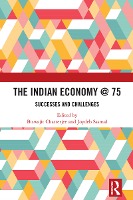Biswajit Chatterjee retired as Professor of Economics from Jadavpur University, Kolkata, India, where he also served as Head of the Department, Dean Faculty Council of Arts, and Planning Commission Chair Professor in Planning and Development. He also taught at Presidency College, Calcutta, and Kalyani University before joining Jadavpur University in 1984. He was also visiting faculty at the Department of Economics, University of Calcutta, Rabindra Bharati University, and Visiting Professor DCRRID, Chandigarh, from June 2010 to June 2014. The major areas of his teaching and research include macroeconomics, international trade, development economics, and Indian economy. He has published in national and international journals of repute, contributed and edited volumes, and has published 8 books and edited 15 books on different branches of development economics. He also delivered lectures at various conferences in India and abroad. He was a consultant to the World Bank, UNDP, and the Planning Commission.
Joydeb Sasmal is former Professor of Economics at the Department of Economics at Vidyasagar University, Midnapore (West), West Bengal, India. He obtained his MA, MPhil, and PhD degrees in economics from the University of Calcutta. Before joining Vidyasagar University, he taught economics at K. K. Das College in Kolkata under the University of Calcutta. His research areas are natural resources and agriculture, sustainable growth, public economics, economic growth, industry and trade, and child labor. He is the author of Resources, Technology and Sustainability: An Analytical Perspective on Indian Agriculture (2016) and has published nearly 50 research papers in international and national journals and in edited and conference volumes. He is the editor of Inclusive Growth and Backward Region Development, jointly with Sebak Kumar Jana. He has supervised PhD students in different fields of economics at Vidyasagar University.

